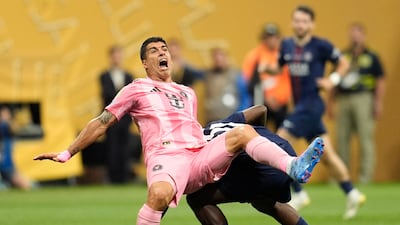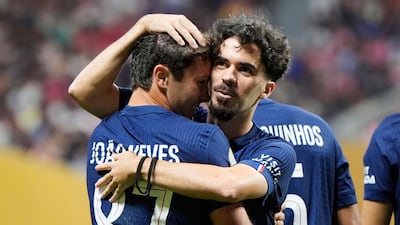Back in late November, Paris Saint-Germain travelled to Bavaria for a meeting with Bayern Munich that looked, from the French club’s lowly perspective in the Uefa Champions League table, genuinely perilous. They were sitting 25th in the 36-team hierarchy, stuck in the basement of the competition’s new format with just four points from as many fixtures.
At Bayern they added no points to that tally, losing 1-0 on an evening peppered with conspicuous individual errors. They played the last 33 minutes with 10 men, Ousmane Dembele, the senior striker, having received two yellow cards. By the time of his departure, PSG had long been trailing, the goalkeeper, Matvey Safonov, promoted to the starting XI ahead of Gianluigi Donnarumma, having fumbled at a Bayern corner, inviting Kim Min-jae to head Bayern in front. PSG head coach Luis Enrique returned to Paris to read, in some French media, fevered speculation that he might very soon be sacked.
That all seems a long time ago. Since then, Luis Enrique had been elevated to a peerless status, the only coach ever to have guided PSG to a European Cup, the most prestigious trophy in club football, and something that in over a decade of costly striving, via a long line of coaches with proven expertise in European competitions, the club had never managed to find the right formula for.




Carlo Ancelotti, Thomas Tuchel and Unai Emery all came and left Paris without the big prize that the club’s backers, the deep-pocketed Qatar Sports Investment group who took majority ownership of PSG in 2011, have targeted above any other. When, last month in Munich, they achieved it with the widest margin of victory in a final – 5-0 against Internazionale – in all the European Cup’s 70 years of existence, Luis Enrique stepped into sporting immortality.
Hindsight suggests the exasperating defeat to Bayern in late autumn had been a turning point, the impulse for corrections that would transform Luis Enrique’s PSG from the old caricature of a team who are domestic bullies – they have won 11 of the last 13 French titles – but always brittle against Europe’s elite, into confident, swaggering masters of their continent. Or maybe even the world, if they can overcome Bayern in Atalanta in the quarter-final of the Club World Cup on Saturday, and put themselves in prospect of a semi-final against Real Madrid or Borussia Dortmund.

Since that trip to Bayern, PSG have lost only five matches of 45. None of those defeats were consequential: They had already wrapped up the Ligue 1 title when they lost twice, late on the French season; the narrow losses in single legs against Liverpool and Aston Villa in the Uefa Champions League were both part of aggregate wins in knockout ties. Botafogo beat them in the group stage of the Club World Cup last month, but PSG won both other pool-phase games to secure progress.
And among the heroes of this momentum are, very prominently, Donnarumma, whose No 1 status was put into doubt back in November, and Dembele, who since his red card in Munich, has been smartly polishing his candidacy for the 2025 Ballon d’Or. He is the leading goalscorer for a goal-rich team.
Dembele has 33 PSG goals from his 50 club matches so far, and 25 of those have been scored in the period, since the turn of the year, that the positive momentum truly gathered. It’s a fine tally for a player sometimes deemed as erratic, and asked to shoulder big responsibilities in a squad that last July waved goodbye to the prolific Kylian Mbappe.

Dembele has not been short of allies, either. Bradley Barcola has 21 goals across competitions, Goncalo Ramos 18 and Desire Doue, the 20-year-old who has been rapidly overtaking Barcola and Ramos in the hierarchy of forwards, has scored 15 times. Achraf Hakimi, the tireless marauder from right-back, has reached double figures for club goals in 2024/25. “In this team, everyone can score and set up goals,” observes Dembele.
The appetite for more goals is not easily stated, either. In the calendar year so far, PSG have dealt out a series of pummellings. Poor Brest conceded 15 in the space of three games against PSG in February – one in Ligue 1, and across two legs of a Champions League last-16 tie – but if results like a 6-1 away win at Saint-Etienne and 4-1 against Monaco are not so exceptional in PSG’s domination of their own league, the thumping scorelines against foreign clubs do catch the eye. The 4-0 victory over Lionel Messi’s Inter Miami last weekend that earned PSG’s place in the Club World Cup’s last eight was the 15th time since January 1 they have scored at least four goals in a single fixture.
The juggernaut has rolled over some high-class opponents, too. Along this highway into history Manchester City, Liverpool, Villa and Arsenal were all beaten on the way to the routing of Inter. The Club World Cup campaign began with a 4-0 thrashing of Atletico Madrid.
Yet if PSG have, over the last six months, put a heavy dent in their enduring, past reputation for regularly failing against the heavyweights of Europe, Bayern still have an ominous aura for the French champions.
There was the loss in November. There was a deeply dispiriting elimination in the knockout phase of the Uefa Champions League two seasons ago, a 3-0 aggregate defeat that left Mbappe coldly reflecting of PSG “this is our maximum” and resolving that his personal future would look better served at Real Madrid. Back in 2020, it was Bayern who crushed PSG’s European Cup dream most cruelly. That season, PSG reached the first of their two finals in the competition. Bayern won it 1-0.
But in Atlanta, PSG take on Bayern with, marginally, the status of favourites. “When you have won the Uefa Champions League, you’re automatically one of the favourites for this competition,” said Dembele. “But this is about the 90 minutes. We saw that [in PSG’s loss] against Botafogo in the group phase. What’s vital is that we stay focussed.”




